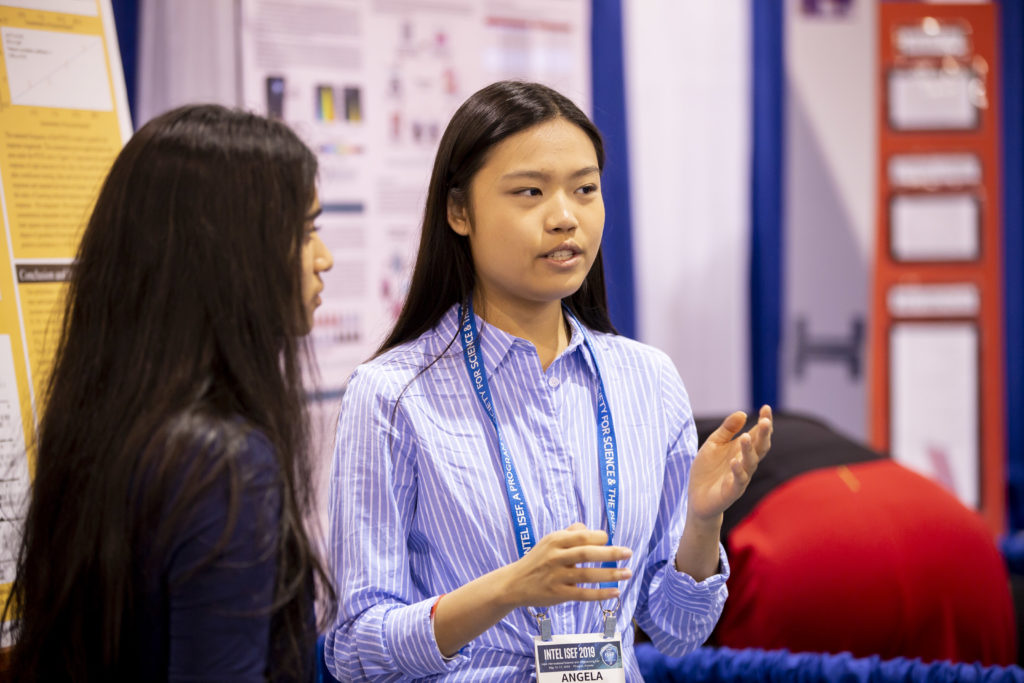
By Diana Nelson
What led to Angela Ding’s brainy decision to enter one of the world’s top science and engineering competitions? You might say it was just a random bee in her bonnet.
As a result, the Corona del Sol High School student is aimed in the right direction to achieve her goal of becoming a medical researcher.
Angela, who will enter her senior year in the fall, was named a finalist by the International Society for Technology in Education for her project to evaluate the brains of bees.
The award was given at this year’s Intel International Science and Engineering Fair, the world’s largest science research competition attracting high school students from all around the U.S.
After it was over, Angela said the event was more like a convention than a competition. She chose to become involved because it seemed like such a good learning opportunity, not because she expected to win an award.
In the face of such stiff competition, event planners said it’s impressive for any student to be chosen for recognition and earn a ribbon and a $1,000 cash prize.
“It was a wonderful learning experience for me and opened my eyes to many of the possibilities for the future in science,” said Angela. “I also was impressed that the scientific community is so welcoming to students.
“It was a chance to meet geniuses,” said Angela during a telephone interview, “and to talk with other students whose ideas for science projects were truly impressive and innovative.”
Some of the ideas deemed most worthy by Angela include a device, worn on the wrist, to control the tremors of Parkinson’s disease. Another involves a method that requires only a small drop of blood for medical tests instead of many vials.
The Intel International Science and Engineering Fair honors the world’s most promising student scientists, inventors and engineers. Finalists are selected annually from hundreds of affiliated fairs. Then, their projects are evaluated onsite by approximately 1,000 judges from nearly every scientific discipline, each with a Ph.D. or the equivalent of six years of related professional experience in one of the scientific disciplines.
Angela says she is aiming for a career in medical research, much like her father, a materials engineer at Medtronic, a bio-medical device company. And, it’s not only his career choice that is an inspiration; so is his encouragement.
“My dad always fostered my love of science and he challenges me to consider questions or problems that need solving to help build my critical thinking skills. He also encouraged my older sister, who choose a career in the STEM field and is an engineer,” said Angela. She is a native of Phoenix who grew up in Tempe. She says she enjoys attending Corona because it offers Advanced Placement programs and have great teachers.
“My AP teachers are very encouraging and work hard to provide a learning environment to grow in,” said Angela.
Though it may be hard to imagine that bees possess a brain large enough to study, they actually are highly evolved, according to many scientists, including Dr. Hong Lei from ASU, associate professor of research in the School of Life Sciences. Lei is actively involved in bee research and agreed to serve as Angela’s s mentor.
Said Lei:
“The program director, Dr. Nate Newman, sent me Angela’s information along with another student. I accepted both of them, and it turned out to be the smartest decision. She is a wonderful student.
“I was very impressed by their progress, particularly when they decided to spend their entire spring break doing experiments. Obviously, all their hard work paid off in the end. I am very proud of them.”

